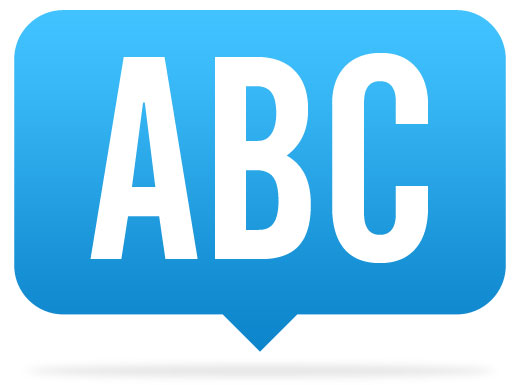The modern Ukrainian alphabet has evolved from Old Slavic Cyrillic writings. Over more than a thousand years of history it has undergone considerable changes. The shape of its letters, close to what we see in modern Ukrainian, was established in the XVII century. Its current composition of letters permanently entrenched in the early XX century.

Video: Learn the Ukrainian alphabet
Created by App2Brain.com
The modern Ukrainian alphabet consists of 33 letters, which are traditionally arranged in the following way:
| Letter | Letter name | Transcription | How to read it | |
|---|---|---|---|---|
|
|
А а
|
а
|
a
|
Stressed – like a in father. Unstressed – like a in human.
|
|
|
Б б
|
бе
|
b
|
Usual – like b in book or be.
At the end of the word – p like in plan.
|
|
|
В в
|
ае
|
v,w
|
Usual – like v in victory, verse.
At the end of the word – like f in file.
|
|
|
Г г
|
ге
|
h
|
Like breathy voiced counterpart of h in hat.
|
|
|
Ґ г
|
ге
|
g
|
Usual – like g in great, garden. At the end of the word – like k in Greek.
|
|
|
Д д
|
Де
|
d
|
Usual – like d in duck, die.
At the end of the word – like t in town.
|
|
|
Е е
|
є
|
e
|
Pronounced like e in the word end, men.
|
|
|
Є є
|
йе
|
ye
|
Pronounced like ye in yellow.
|
|
|
Ж ж
|
же
|
zh
|
Usual – like s in pleasure, measure At the end of the word – like sh in shift.
|
|
|
З з
|
зе
|
z
|
Usual – like z in zebra, zoo. At the end of the word – like s in sleep.
|
|
|
И и
|
и
|
i
|
This sound is similar to ih, but the lips are moved more forward and the closest is ee in week or weep, still with lips moved forward. Listen to the examples.
|
|
|
І і
|
і
|
ee
|
Stressed/unstressed – like ee in peep, peek.
|
|
|
Ї ї
|
йі
|
yec
|
Pronounced like yee in a yeehaw exclamation.
|
|
|
Й й
|
йот
|
y
|
This is a consonant which is pronounced like final y in boy.
|
|
|
К к
|
ка
|
k
|
Pronounced like k in kite.
|
|
|
Л л
|
ел
|
l
|
Pronounced like l in light, lamp.
|
|
|
М м
|
ем
|
m
|
Pronounced like m in mother, miracle.
|
|
|
Н н
|
єн
|
n
|
Pronounced like n in notebook.
|
|
|
О о
|
о
|
o
|
Stressed – oh like a in talk. Unstressed – either ah like in park or uh like o in season.
|
|
|
П п
|
пе
|
p
|
P like in park.
|
|
|
Р р
|
ер
|
r
|
There is no such sound in English, it is like Spanish or Italian r in such words as madre or ragazza. It’s a flap r. Listen to the examples to get better idea how is it pronounced.
|
|
|
С с
|
ес
|
s
|
Pronounced like s in see.
|
|
|
Т т
|
те
|
t
|
Pronounced like t in tea or tie, but without aspiration. The tongue is located closer to the teeth than in English.
|
|
|
У у
|
у
|
oo,w
|
Pronounced like oo in book or shoot.
|
|
|
Ф ф
|
еф
|
f
|
Pronounced like f in fact, fast.
|
|
|
Х х
|
ха
|
kh
|
There is no such sound in English, the closest will be German ch, or the Kh – it’s harder than h in English and is stronger. Listen to the example.
|
|
|
Ц ц
|
це
|
ts
|
There is no such sound in English, the closest will be ts in cats or dots, while pronounced not like two sounds, but like one.
|
|
|
Ч ч
|
че
|
ch
|
Pronounced like ch in change.
|
|
|
Ш ш
|
ша
|
sh
|
Pronounced like sh in short, sharp.
|
|
|
Щ щ
|
ша
|
shch
|
Consists of two sounds: sh + ch, as in English cheese.
|
|
|
Ь ь
|
м’який знак
|
—
|
This letter (“soft sign”) doesn’t denote any sound, it means that the preceding consonant is palatalized: треть.
|
|
|
Ю ю
|
йу
|
yoo
|
Pronounced like u in use.
|
|
|
Я я
|
йа
|
ya
|
Pronounced like ya in yard.
|
Most of the characters in the Ukrainian alphabet are unambiguous, which means that each of them stands for one sound (phoneme). The six letters а, о, у, є, и, і denote the corresponding vowels, while б, в, г, г, д, ж, з, й, к, л, м, н, п, р, с, т, ф, х, ц, ч, ш correspond to consonants. The remaining 6 letters have their own characteristics:
The letter ь in itself does not signify any sound. It is used only to refer to soft consonants:
- день (ден’) – day
- льон (л’он) – linen
- пеньок (пен’ок) – tree stump
- льод (л’од) – ice
The letters ї and щ always denote two sounds: the first – йі (yee), the second – шч (shch):
- їжак (йіжак) – hedgehog
- їжа (йіжа) – food
- з’їзд (зйізд) – congress
- поїздка (пойіздка) – journey, trip
- щітка (шчітка) – brush
- блищати (блишчати) – shine
- щеня (шченя) – puppy
The letters я, ю, є havе a double meaning:
- Directly after the consonant they represent softness and previous consonant sounds and in accordingly sounds а, у, є
- нянька [n’an’ka] – nurse
- лялька [l’al’ka] – doll
- нюанс [n’uans] – nuance
- тютюн [t’ut’un] – tobacco
- синє [syn’e] – blue
- In other positions (at the beginning of a word, followed by vowels, after the apostrophe and soft sign) they represent two sounds respectively: йа (ya), йу (yu), йе (ye)
- яма [yama] – pit
- зв’язувати [zvyazuvaty] – link
- альянс [al’yans] – alliance
- юрба [yurba] – crowd
- пояс [poyas] – belt
- в’юн [vyun] – eel,
- Нью-Йорк [n’yuyork] – New York
- з’єднання [zyednannya] – connection
In addition, the combination of letters дж and дз have a double meaning:
- On the verge of prefix and root they represent two distinct sounds respectively — д + ж and д + з: підживлений (fuelled), переджнивний (before harvest), надзвичайна (extraordinary), відзначений (awarded).
- In other positions, they represent one sound respectively — дж and дз: джерело (source), джунглі (jungle), джміль (bumblebee), погоджений (agreed), затверджений (approved), дзвінок (the call), кукурудза (corn).

Download your free language learning guide
Our free 18-page PDF ebook will teach you how to:
- Get (and stay) motivated learning a new language
- Achieve 80% of your goals with only 20% of the effort
- Make your learning experience more fun than ever
More Ukrainian lessons
- Numbers in Ukrainian
- Basic Conversation in Ukrainian
- Basic Ukrainian Verbs
- Basic Ukrainian Nouns
- Basic Ukrainian Adjectives
- Colors & Appearance in Ukrainian
- Countries & Languages in Ukrainian
- Date & Time in Ukrainian
- Holidays & Good wishes in Ukrainian
- Food & Drinks in Ukrainian
- People & Professions in Ukrainian
- Family & Friends in Ukrainian
- Body & Health in Ukrainian
- Cities & Traffic in Ukrainian
- Travelling & Leisure time in Ukrainian
- Ukrainian videos
- Vocabulary Trainer: Ukrainian
- Overview: Learn Ukrainian

This is a good website if you want to learn the Alphabet of a language I totally recommend this!
Thank you!